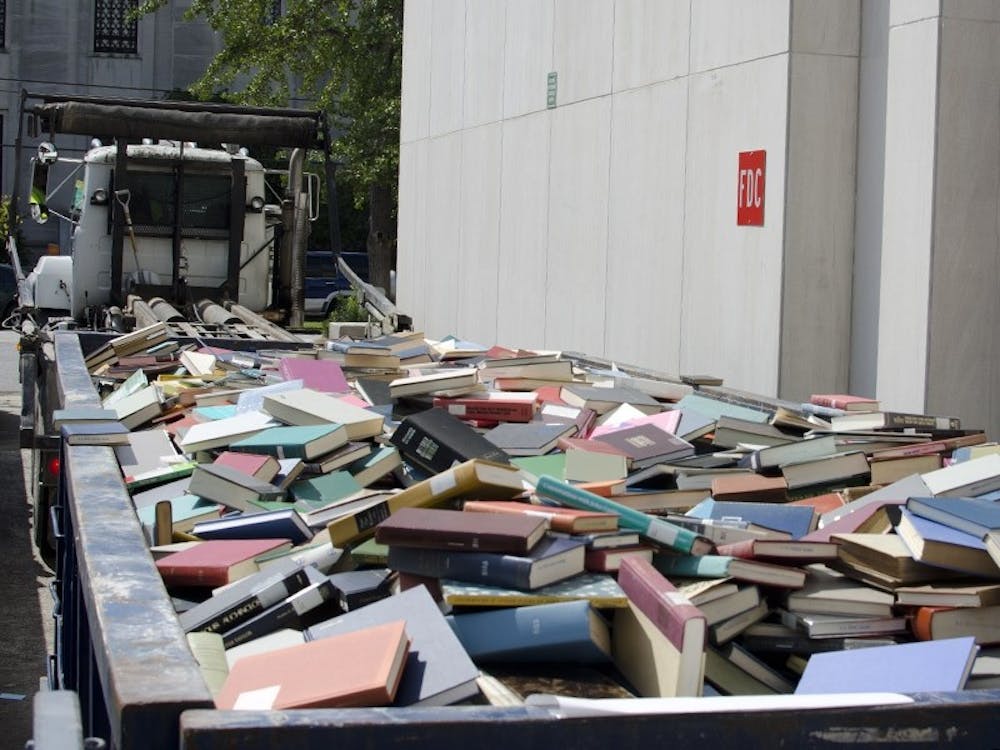Downsizing marks growing trend
A lot has changed for libraries in the last decade.
Circulation has plummeted, collections have shrunk and Google has become the go-to clearinghouse for information.
It’s forced branches to restructure and focus more on digital materials — and less on their physical presence.
It was a trend made manifest at the South Carolina State Library Thursday afternoon, as a handful of USC students rifled through a dumpster filled with decades-old volumes.
The books kept going down for feet, they remarked, as they snagged little-circulated and outdated plays, anthologies and novels.
A few minutes later, around 3 p.m., they scattered. A truck had come to cart them off; the books were off to be recycled, and it wasn’t the first load, library employees standing outside said.
Spurred by budget cuts and a big drop in in-person visitors, the State Library is downsizing.
It used to fill two buildings on Senate Street, a short walk from USC’s campus. Now, it’ll take up just one, a move that’ll save the state $440,000, according to Leesa Benggio, the library’s deputy director.
To do so, it’s culling its collections. That, said spokesman Curtis Rogers, gives the library the chance to work on “refocusing” its offerings.
“We’re focusing on the needs of state government instead of replicating what public libraries do,” Rogers said.
That means materials on business, science, technology and IT are in, and copies of John Steinbeck and F. Scott Fitzgerald are out.
The dumpster drew some criticism on social media Thursday, as people wondered why the books were being destroyed, not donated to charities in a state with a lagging education system.
But Rogers said the library offered the books to other libraries across the state, which helped fill in Columbia International University’s library, which was destroyed in a 2010 fire.
Only about 11 percent of the volumes they removed were recycled, said Chris Yates, its information services manager, and those that were will generate money for newer materials.
Blocks away, the rapidly changing landscape in the library business has affected USC, too.
Tom McNally, the university’s dean of libraries, said circulation has fallen nearly 90 percent in the last decade, and USC’s buying fewer hardcover books.
Before the Internet transformed the business, McNally said, USC’s libraries moved about a million volumes each year and bought 150,000 more.
Now, it’s circulating fewer than 120,000 and buying around 20,000, as the university focuses more on online resources and fewer physical books are being published.
But when it buys, McNally said, it buys for keeps, since lesser-circulated books could grow in relevance.
In the 1950s, he said, few scholars considered F. Scott Fitzgerald’s works, but by the 1970s, they were studied widely.
The possibility of a similar resurgence drives the library’s policies, McNally said.
“We never discard our materials,” he said.
Still, more people are going to the Thomas Cooper Library to study, he said, and they need more space, so McNally said he’d like to grow the size of the Library Annex to house more low-circulation books and clear out more room on campus.
And although that move would see fewer students roaming the stacks in Thomas Cooper, McNally, who’s worked in USC’s libraries for more than 20 years, said he doesn’t reminisce too much about how things have changed.
“I remember those days well, and they had their own set of challenges,” McNally said. “But I’m not sentimental about them. To me, this is the most exciting time of my career ... I wouldn’t go back for anything.”

